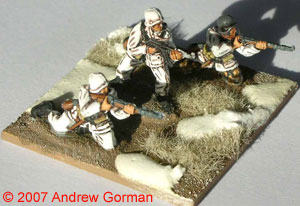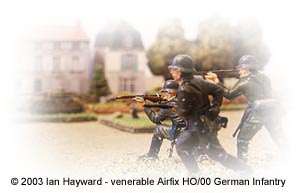
Andrew Gorman in New Zealand painted up these 1/72nd scale (20mm) figures from Revell with vehicle kits from Airfix & Fujimi.
Rules and Organizations for Company-Level WW-II Gaming

Andrew Gorman in New Zealand painted up these 1/72nd scale (20mm) figures from Revell with vehicle kits from Airfix & Fujimi.

Joe Kelly provides details of the infantry (the non-Fallschirmjäger type) that proved the bulk of the manpower in the Luftwaffe Field Divisions. The “Jäger” Regiments were formed mostly from Ground Crew and rear area troops and a typical regiment as as follows:
Luftwaffe Field Regiment
Regimental Headquarters
3-4, later 2, Luftwaffe Field Battalions, with;
Headquarters
3 Light Companies
1 Heavy Company
Continue reading “German Luftwaffe Field Regiment 1942-1945”

Joe Kelly provides his take on the German Gebirgsjäger (Mountain Troops) organisation for the mid-war period. The TO&E had been reorganised from what was present early way, and in 1943 the Regiment was organised as follows:
Regimental HQ Group
1 Signal Platoon
1 Technical Company, with;
1 Signal Platoon
1 Engineer Platoon
1 Light Howitzer Platoon
1 Heavy Mountain Howitzer Battery

In the rules, Arty suggests that each base have a couple of numbers written on it; one number would denote company membership, the other platoon membership. He also suggests the use of prone figures, wounded figures and rubble to mark whether a unit is Pinned, “No Fire”, Suppressed or Ground Hugging. I like the latter because it does not involve a nasty number or word written on a card, which would spoil the look of my battlefield. I dislike the former for the same reasons.